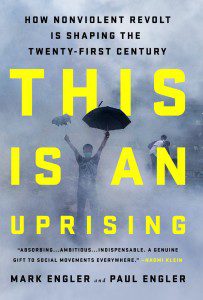Explore the power of nonviolent action

Mark Engler and Paul Engler’s book “This Is An Uprising” is a must-read for anyone involved in progressive social change and the strategies and tools necessary to implement it. Naomi Klein calls the book “a genuine gift to social movements everywhere.” The Englers examine the pros and cons of two often competing methodologies: the one-on-one, door-knocking, patient work of community based organizing championed by Saul Alinsky vs. mass mobilization and civil disobedience promoted by Frances Fox Piven.
The Englers dissect headline social movements and uprisings: India’s independence from the Britain, the Civil Rights Movement, Arab Spring, Occupy, the overthrow of Slobodan Milosevic in Serbia, the Harvard Living Wage Sit-In, and others. With the advantage of time and perspective they analyze which tactics worked and which didn’t and conclude that the two different approaches, when used together, can be more effective than one used alone. “Despite their differences, both structure-based organizing and mass mobilization share this strategic orientation: they both attempt to change the dominant institutions that affect peoples’ lives….” the Englers observe.
Campaigns that attempt to topple old, outdated beliefs and the pillars in our society that support them, must win over majority opinion by, as environmental journalist David Roberts says, moving the center by pulling from one end. According to the Englers, pulling from one end is what turned gay marriage from an unpopular fringe issue into a civil rights crusade whose time had come.
The process of making change by swaying public opinion can take a circuitous approach. Quoting Serbian activist Ivan Marovic: “In classical politics you’re interested in the direct route to victory. But in building a movement, you’re interested in the more fundamental change that happens through the activation of citizens.
As the Englers point out, momentum-driven organizing necessarily places a greater focus on the symbolic. But they offer this caution: “Organizers of civil resistance cannot be content with empty declarations of victory or with merely ‘speaking truth to power.’ They must be hard headed in assessing their progress in winning over advocates and sympathizers from outside their immediate networks, always guarding against tendencies to become insular ‘voices in the wilderness.’” (Emphasis added). This is a problem we often face in our own community – reaching outside our tribe and drawing others in.
The Englers perceive history shows us that nonviolent action involving some risk or personal sacrifice on the part of the participants – thereby demonstrating the seriousness of their commitment – is more successful. Samples include bus boycotters willing to walk for miles rather than ride on segregated public transportation, Julia Butterfly Hill who weathered the elements in an old-growth tree to prevent it from being cut down, and more recently Native Americans at Standing Rock, who were willing to face down dogs and fire hoses to protect their water. Making these highly visible public sacrifices before an empathetic public can galvanize seismic shifts in perception and support.
Once the public’s attention has been reached and the issue raised, activists must focus on how the gains they have won can be institutionalized and made durable. The Englers show us that this is where structure-based organizing can step in and take up the baton. Although not a complete loss, this is where the Occupy movement failed – it was unable to translate the momentum created by civil disobedience to create permanent, meaningful change.
Although written as a scholarly piece and heavily annotated, “This is An Uprising” is an absorbing read. Both of the authors come from an activism background. Mark Engler is a writer based in Philadelphia, an editorial board member at Dissent, and contributing editor at Yes! Magazine and author of How to Rule the World: The Coming Battle Over the Global Economy. Paul Engler is a founding director of the Center for the Working Poor, based in Los Angeles. He worked for more than a decade as an organizer in the immigrant rights, global justice and labor movements. Hey Central Coast Bioneers community – should we get Paul up here for the 2018 conference? Email us at info@ecologistics.org and let us know what you think.
